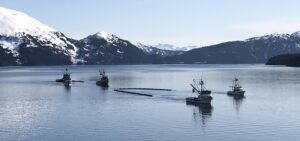European green crab spreading in southeast Alaska
In 2022, the Metlakatla Indian Community first spotted shells of European green crab, or Carcinus maenus, during regular monitoring at the Annette Islands Reserve. Subsequent monitoring turned up live crabs. This summer, the group reported a large population growth in the surrounding area. Monitors reported trapping 2,133 in 2023, and 1,865 in 2024. That number … Read more
